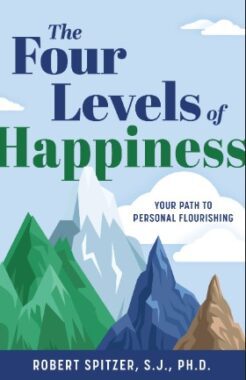Some of us turn to pleasure for happiness.
And marketers definitely encourage us to do so because they can sell us momentary pleasures. There are lots of things that bring us pleasure. Good food is one example. Maybe you really like fresh strawberries. And look! They’re on sale right now! You could get a pound of fresh strawberries, and you could eat strawberries with whipped cream, and that would make you happy, wouldn’t it?
Unfortunately, the answer is no.
You would enjoy the strawberries, that’s true, but they wouldn’t make you happy. If you were an unhappy person before you ate the strawberries and whipped cream, then afterward you’d be an unhappy person full of strawberries and whipped cream. They tasted good while you were eating them, but they didn’t make a permanent change in your life. And you can’t just keep eating strawberries and whipped cream forever. Every pleasure is like that: you reach a point very quickly where the pleasure turns to misery.
That’s true even of completely innocent pleasures, like fresh strawberries. They’re good for you, at least in moderation. But you can eat too many of them, and then you’re going to suffer the consequences. And there are other pleasures that lead to much more than a bellyache.
Those miseries that come from too much pleasure feel all the worse because we know that we have no one to blame but ourselves. Our conscience hurts as much as our stomach when we eat too many strawberries: “Why wasn’t I more careful? Even a five-year-old knows that eating too much of a good thing is a bad idea. Why was I dumber than a five-year-old?” So pleasure isn’t enough to make us happy. In fact, pleasure can make us miserable. Of course, that doesn’t mean that pleasure is a bad thing: it just means that it isn’t the route to lasting happiness.
But then what is?
——-
Some of us look for happiness in success.
It’s not always easy to define what “success” is, but we usually mean having more of something than other people have—more money, or a higher position, or a bigger house, or a better car. But why do we want those things? Well, that’s hard to say. If your car starts when you turn the key, if it’s comfortable to sit in while you drive, if it gets you where you’re going on time, then why should you care if your neighbor has a car that costs twice as much?
But we do care.
We constantly measure ourselves against other people. We divide the world into winners and losers. The one who drives the nicest car wins. Human beings are naturally competitive, and there’s a good reason for everything that’s natural. Just like the reward and punishment of pleasure and pain, competition drives us to get things done that need to be done. It pushes us harder than mere pleasure and pain can, and it makes us think of the future when pleasure and pain keep us stuck in the present.
But, just like pleasure, competitiveness doesn’t lead to any lasting happiness. People who look to competition for their happiness usually end up miserable. They may reach the peak of success, but they always feel as if their positions are threatened. Think of all the tyrants and dictators in history: How many of them were known for their lives of quiet peace and contentment? Not many. In fact, I can’t think of a single one. They all spent their whole careers worrying about what might happen if this or that went wrong: “What if my opponents turn the people against me? What if there’s a secret conspiracy to assassinate me? What if my cook is poisoning my food right now?”
So ambition isn’t what we’re looking for. It’s a good thing in its place, but it isn’t the route to lasting happiness.
——-
Some of us turn to politics for happiness.
After all, don’t we want to fix what’s wrong with the world? And isn’t that what every politician promises to do? Isn’t that what we promise ourselves when we start getting into politics? If we could just get this law passed, or this program implemented, or this expensive piece of infrastructure built, then we’d be on our way to fixing what’s wrong with the world. Or if we could just get this candidate elected—she’s so wise and virtuous that she’d certainly make all the right choices. And if we fixed what was wrong with the world, we’d all be happy.
Wouldn’t we?
But politics is not a good bet for happiness. In fact, there’s good evidence that people are less happy the more they think about politics. Eventually, the ultimate expression of politics is civil war, where we decide that standing up for some principle we hold or righting some injustice we perceive is so important to our happiness that you must either agree with us or die. People who live in countries torn by civil war are not happy. You’re probably willing to take my word for that, but the statistics back me up too. The countries that score lowest on happiness surveys are the ones where civil wars have been going on for a long time.
So it looks as though politics won’t bring us happiness either. I should point out again that I don’t mean we shouldn’t care about politics. We should do all we can to make sure our country is well governed. It’s our duty as citizens and neighbors. But politics won’t make us happy by itself. We won’t find a political solution to the happiness problem.
Then where will we find it?
——-
Some people turn to love for happiness, and they’re on the right track.
Isn’t love all you need? Won’t love make us happy? It certainly is true that human love is a good thing. But if you want proof that human love isn’t all it takes to make us happy, all you have to do is tune in to your local country music station for fifteen minutes. There’s a reason so many sad songs show up in the playlist—just like there’s a reason so many murders are described as “crimes of passion.” Love is a strong feeling, and it doesn’t always lead us to happiness. It can bring out the worst and most selfish parts of our nature.
Still, love is pushing us in the right direction.
It makes us think of someone other than ourselves, and in more than a competitive way. For the first time, we’re thinking about how we could make someone else happy. We’re built for that. Empathy is also part of the equipment that comes with being human. We have a capacity for feeling what others feel, so what others feel has an effect on our own happiness. And it certainly is true that forming human relationships is a big part of happiness.
The longest of all long-term psychological studies is a Harvard cohort study that has been going on for more than eighty years. Its observations aren’t all that surprising, but it’s useful to know that science confirms what everybody already knew. Money can’t buy happiness. Success can’t buy it either. Close human relationships are better predictors of long-term happiness than anything material or any measure of worldly success.
So you’re definitely on the right track if you’re thinking of love as the road to happiness. You’re doing far better than if you stopped at pleasure or success.
But there’s even more to life than love.
——-
Some of the happiest people you’ll ever meet are people who have nothing.
At least they have nothing material. What they do have is a strong spiritual life. Research bears this out too. “Study after study has found that religious people tend to be less depressed and less anxious than nonbelievers, better able to handle the vicissitudes of life than nonbelievers.” A study in Europe found that belonging to a religious organization was the only social activity that was a predictor of long-term happiness.
Even charity work, divorced from religion, didn’t have that effect.
A Pew Research Center study found a “striking” gap in happiness between actively religious people and religiously unaffiliated individuals in the United States. Over and over, studies come to the same conclusion—and they’re not studies done by religious organizations. We have to recognize, then, that the spiritual life is part of human nature too. We’re built to seek pleasure and avoid pain. We’re built to be competitive. We’re built to feel empathy with other people. And we’re built to look for a higher truth beyond what we can see and feel.
I think what this means is that we’re designed to climb up a four-rung ladder of happiness. To put it a different way, we have four main kinds of desires, and they’re all important—but they’re arranged in an ascending scale. If we want to be happy, we have to take them all into account.
That’s what I want to help you do.
I want to help you find your own happiness by showing you where to look for it.
+

This article on ‘It All Starts with a Step – How to Climb the Ladder of Happiness’ is adapted from the book The Four Levels of Happiness: Your Path to Personal Flourishing by Robert Spitzer, S.J., PH.D. which is available from Sophia Institute Press.
Art for this post on a reflection from “The Four Levels of Happiness: Your Path to Personal Flourishing” by Robert Spitzer, S.J., PH.D.: cover used with permission; Photo by Depositphotos.




